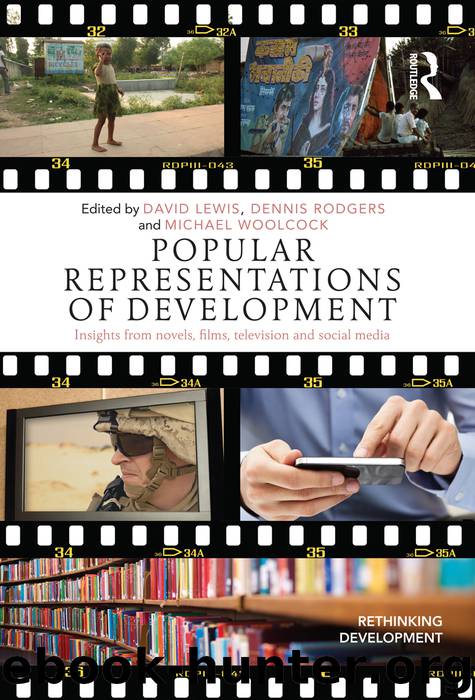Popular Representations of Development by Unknown

Author:Unknown
Language: eng
Format: epub
ISBN: 978-1-135-90263-6
Publisher: Routledge
8 Affective histories
Imagining poverty in popular Indian cinema
Esha Shah
Development theories routinely conceptualize poverty in rational, abstract, and cognitive terms as an effect or cause of one or the other form of “lack” – for instance, lack of health, income, resources, well-being, education, or capabilities. Such theories overwhelmingly emphasize economic rationales, whereby a freely choosing individual becomes the vehicle for the acquisition, allocation, or distribution of resources and capabilities. As such, they foreclose the possibility of getting to grips with the subjective dramas of multiple actors populating “poverty situations”, and they also widely employ mechanical, spatial, and hydraulic metaphors – up/down, below/above, centre/periphery, inside/outside, and inclusion/exclusion – to quantify or qualify the phenomena of poverty, which is therefore largely described negatively – the meaning of poverty implies below, down, periphery, outside, and exclusion. These cognitive theories arguably reflect the epistemology of the researching subject rather than the researched subject, and construct poverty as an abstract measure of some sort of lack signifying a negative status rather than seeing the phenomenon in relational terms, as an inter-subjective experience.
This chapter looks at the affective narratives of poverty in Indian popular cinema in Hindi. It maps the way in which the “poverty situations”, as inter-subjective dramas, have been depicted in popular culture since independence. The emphasis here is on mapping the shift in the affective mood and, correspondingly, the underlying norms and values delineated in these dramas. Mapping this shift in the representation of poverty as an inter-subjective aspect of affect is the means by which the chapter aims to offer an alternative explanation of the way in which poverty situations are embedded, on the one hand, in the psychic structures of public morality, and on the other, in the social and cultural institutions of the time.
Poverty as affects
Poverty is an intensely debated topic in India. Estimating poverty trends – the extent to which poverty has declined in general and especially since the liberalization as a result of increasing economic growth – has been a controversial topic (Sundaram and Suresh, 2003; Deaton, 2004; Dreze and Sen, 2008; Deaton and Dreze, 2002). The debate is heavily polarized: the current times, for example, are described by the proponents of economic growth as a period of unprecedented improvement, whereas opponents see widespread impoverishment. Some statisticians conclude that merely 15 per cent of the population lives under the poverty line, whereas pessimistic estimates put the figure as high as 35 per cent. Methodologically, these debates, irrespective of the viewpoint, focus largely on counting “headcount ratios”, poverty indexes, or poverty-gap indexes. For instance, after exhaustively consulting National Sample Survey data, Deaton and Dreze (2002) conclude that during 1993–1994 and 1999–2000 there was a sustained poverty decline, from 36 per cent to 26 per cent, in most states in India. However, they argue that although poverty in the absolute sense has declined, there has been a marked increase in inequality – which is measured here in terms of the disparities in per capita expenditure, cereal consumption, and other indications such as rates of literacy, nutrition, and crime.
Download
This site does not store any files on its server. We only index and link to content provided by other sites. Please contact the content providers to delete copyright contents if any and email us, we'll remove relevant links or contents immediately.
Call Me by Your Name by André Aciman(20466)
Ready Player One by Cline Ernest(14616)
How to Be a Bawse: A Guide to Conquering Life by Lilly Singh(7458)
Wiseguy by Nicholas Pileggi(5745)
The Kite Runner by Khaled Hosseini(5151)
On Writing A Memoir of the Craft by Stephen King(4916)
Audition by Ryu Murakami(4911)
The Crown by Robert Lacey(4785)
Call me by your name by Andre Aciman(4659)
Gerald's Game by Stephen King(4623)
Harry Potter and the Cursed Child: The Journey by Harry Potter Theatrical Productions(4484)
Dialogue by Robert McKee(4374)
The Perils of Being Moderately Famous by Soha Ali Khan(4203)
Dynamic Alignment Through Imagery by Eric Franklin(4199)
Apollo 8 by Jeffrey Kluger(3690)
The Inner Game of Tennis by W. Timothy Gallwey(3641)
Seriously... I'm Kidding by Ellen DeGeneres(3620)
How to be Champion: My Autobiography by Sarah Millican(3577)
Darker by E L James(3503)
